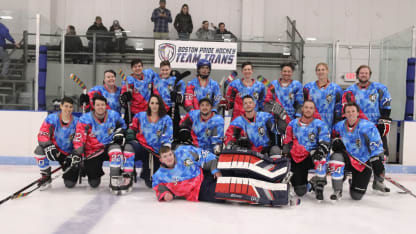Many of them had only ever been the single transgender athlete on a team, had never been able to watch a transgender athlete growing up. But now, here they were, all of them, together.
"It didn't feel like a team that had never met before," goalie Mason LeFebvre said. "Even if we didn't know each other, we all kind of felt like we did, just because we knew that we'd all had similar hockey experiences -- awkward locker rooms and stuff -- and I think that helped because we were able to let our guard down."
Believed to be the first entirely transgender sports team in the United States, Team Trans played its initial games together in 2019 in a Friendship Series against Boston Pride, an LGBTQ hockey team, meeting for the first time before the game.
Team Trans will take the ice again Saturday and Sunday at Capitol Ice Arena in Middleton, Wisconsin, just outside of Madison, facing the Madison Gay Hockey Association, which is "the largest queer hockey association in the world," according to its president, Avery Cordingley.
Players on Team Trans will travel from all over the United States, Canada, and Japan, with all travel fees paid for by donations, including one from the NHL. The team has 55 players who have played for it or will this weekend, ranging from novice to advanced, and its Facebook group has 200 members, a number that greatly expanded after the first series.
The hope is that there could be a Friendship Series once a year, plus travel to other LGBTQ tournaments, as they strive to open doors for other transgender athletes, to demonstrate what is possible.
"It's showing that trans athletes, it's not controversial at all for us to play sports," said Harrison Browne, one of the most visible trans hockey players. "We should be able to play sports. Sports is such an integral part of a lot of people's lives. I wouldn't be who I am today without hockey and it's a shame that people are trying to take that away from kids. It's really important to show success stories and to show that trans and nonbinary athletes just want to play the sport."
For Browne, who played in the National Women's Hockey League, there was a comfort in the first series in Boston. While acknowledging that not all transgender people have the same "cookie-cutter" experience, there were commonalities that he doesn't often feel in hockey.
"I felt really included, because sports is such a binary world," said Browne, who won't be playing this weekend because of conflicts. "It was really nice to not think about the segregation of men's sports and women's sports and just play a sport, be part of a team."
It was part of what caused Browne to retire from the sport at 24, the idea that he couldn't be fully himself. And that was what Team Trans has allowed Browne and others to do: To be themselves. To open doors. To represent. To take away the burden of kids who might be playing closeted, who might not feel that there is a space for them.
"I had a kid tell me on Instagram after the series that his two favorite goalies were Henrik Lundqvist and me," LeFebvre said, of the New York Rangers legend. "So it's really important for the players, but also for the kids who look up to the players."
Ultimately, the message of Team Trans is simple.
"That you belong, no matter who you are, no matter what your gender is, no matter what color socks or tape you use, you have a spot in hockey," Cordingley said." At the end of the day, all we want to do is be like: There is a place for you in this sport."

